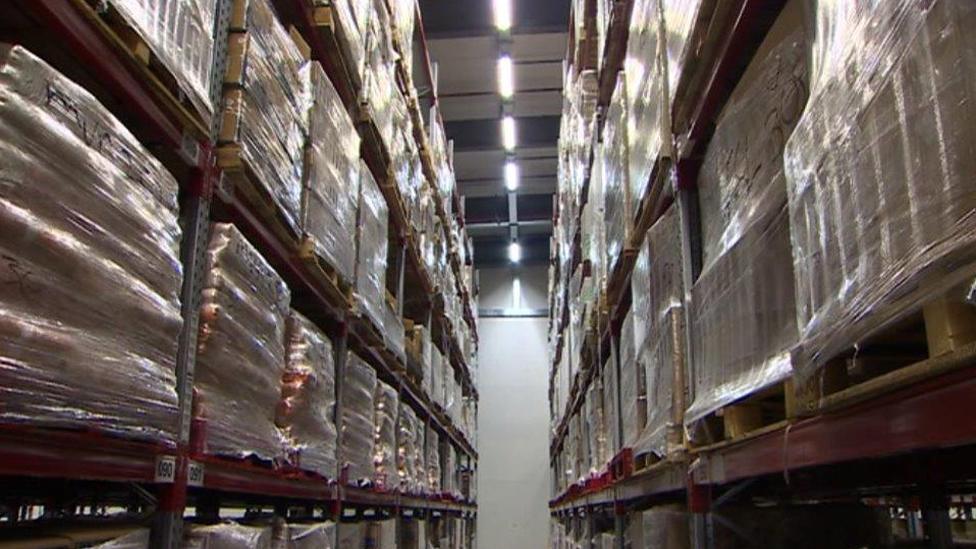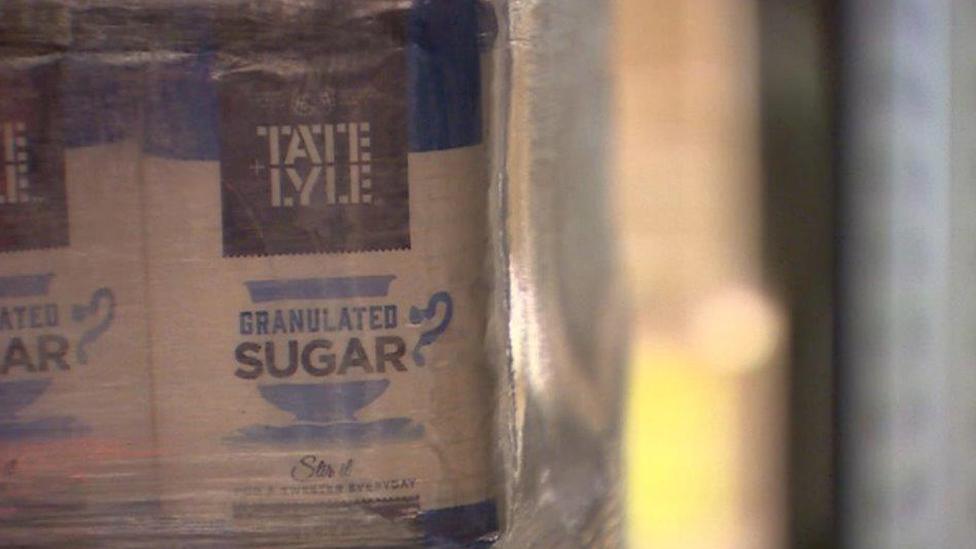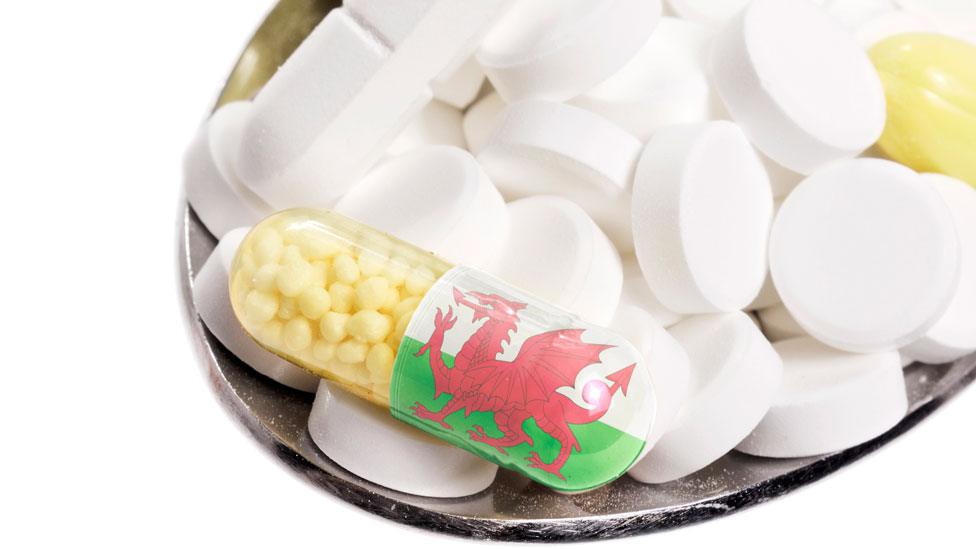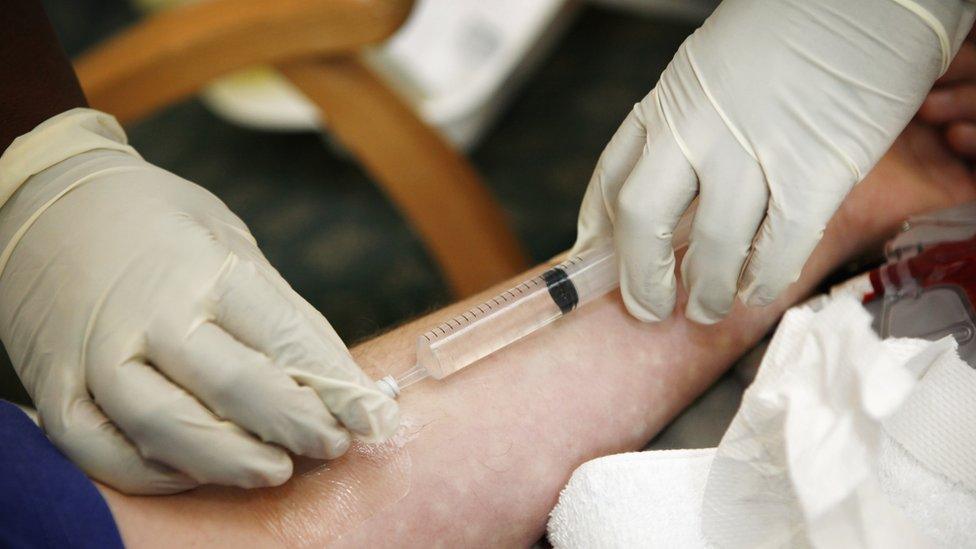Care homes part of no-deal Brexit warehouse plan
- Published
- comments

The warehouse holds 1,000 different products over 240,000 sq ft (22,300 sq m)
Supplies for care homes as well as hospitals are being stockpiled at an £11m warehouse in south Wales.
NHS Wales bosses say elderly people in residential homes will not be left behind under no-deal Brexit planning.
There are 1,000 different products, ranging from bandages to food being stored for the health and social care sector.
It comes as Health Minister Vaughan Gething warned of "significant potential impacts" of a no-deal Brexit
The Welsh Government bought the warehouse near Newport, as part of arrangements unveiled early this year.
The 240,000 sq ft (22,300 sq m) building has two months' worth of extra supplies.
But it wants to ensure those getting social care in the community will also not run short.
Mr Gething said they were ensuring robust arrangements were in place to respond as issues arose.
"But let me be absolutely clear - whilst we are doing everything we can to prepare, no amount of planning can guarantee a disruption-free Brexit," he told AMs on Tuesday. "To suggest otherwise is deeply misleading and irresponsible."
Mr Gething said buying and stocking the extra warehouse for NHS and social care equipment, essential items and food had cost £11m - money which he said could instead have paid for seven replacement MRI scanners.
The additional stockholding for supplies and products - for everything from dressings and bandages to gloves, syringes and needles - has cost more than £5m so far.

Food is being stocked for care homes, as well as hospitals
Mark Roscrow, programme director for NHS Wales Shared Services Partnership, said it was "very sensible" to ensure there was the right level of assurance.
"It's what we use on a day-to-day basis - and a whole range of different shapes and sizes," he added.
"People are always astonished at the volume of things like toilet rolls. We've had a lot of focus on food - but it does surprise me people think we don't feed patients."
The warehouse itself can be sold or re-used if Brexit does not happen.
Dr Andrew Goodall, NHS Wales chief executive, said having its own warehouse ensured the service could access supplies "which aren't available routinely in the English system".
"But the particular benefit is we can offer the social care system products to support them if supplies fall short," he added.

What about NHS and social care workers?
There is still concern about the potential impact of Brexit on the NHS and care workforce, although there has not yet been a significant drop in EU staff in Wales.
In Wales, it is estimated that at least 1,462 EU nationals are directly employed by the NHS - 1.6% of the workforce. , external
Another 6.4% of staff in registered social care settings in Wales, external are EU nationals - estimated at about 2,900 workers, most in residential care.
The health minister warned they were seeing a reduction in wider overseas recruitment, which would have a "serious effect" in the medium term if it continued.
NHS Wales is worried that campaigns like Train, Work, Live are being affected.
"We may also see health and care staff moving to jobs in other sectors, some of which have seen significant losses of EU nationals," added Mr Gething.
In terms of staff resources, the Welsh Government estimates the time dedicated to no-deal preparedness is taking up the equivalent to up to 100 full-time posts.
Mr Gething is also worried that the cost of food, fuel and medicines are likely to increase with a no-deal, which could hit the care sector.
The UK government has insisted it will not negotiate a further delay to Brexit beyond the end of October, saying this would be costly for the UK, while the prime minister said his proposals to the EU involved compromise.

What about medicines?
The Welsh Government is part of UK-wide arrangements to maintain supplies of medicines and radioisotopes.
"We do need the public to understand that we've put in all the arrangements necessary to maintain the supply of medicines," said Dr Goodall.
"Even if there could be problems with individual drugs, we're able to deploy alternatives. We need the public to trust that supplies will be made available as needed and absolutely the wrong approach would be to stockpile medicines and over-worry about these issues."
The annual flu campaign was also launched on Tuesday with the chief medical officer for Wales insisting supplies of vaccines would be available by the end of October, when they were needed.
- Published2 October 2019

- Published21 January 2019

- Published7 March 2019

- Published27 September 2019

- Published1 October 2019

- Published4 July 2018

- Published26 October 2017
